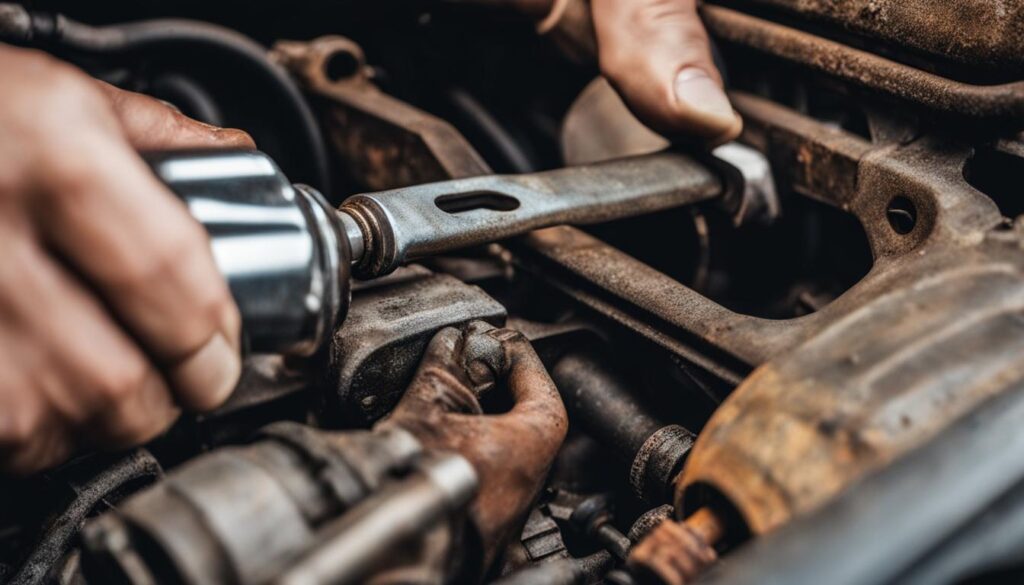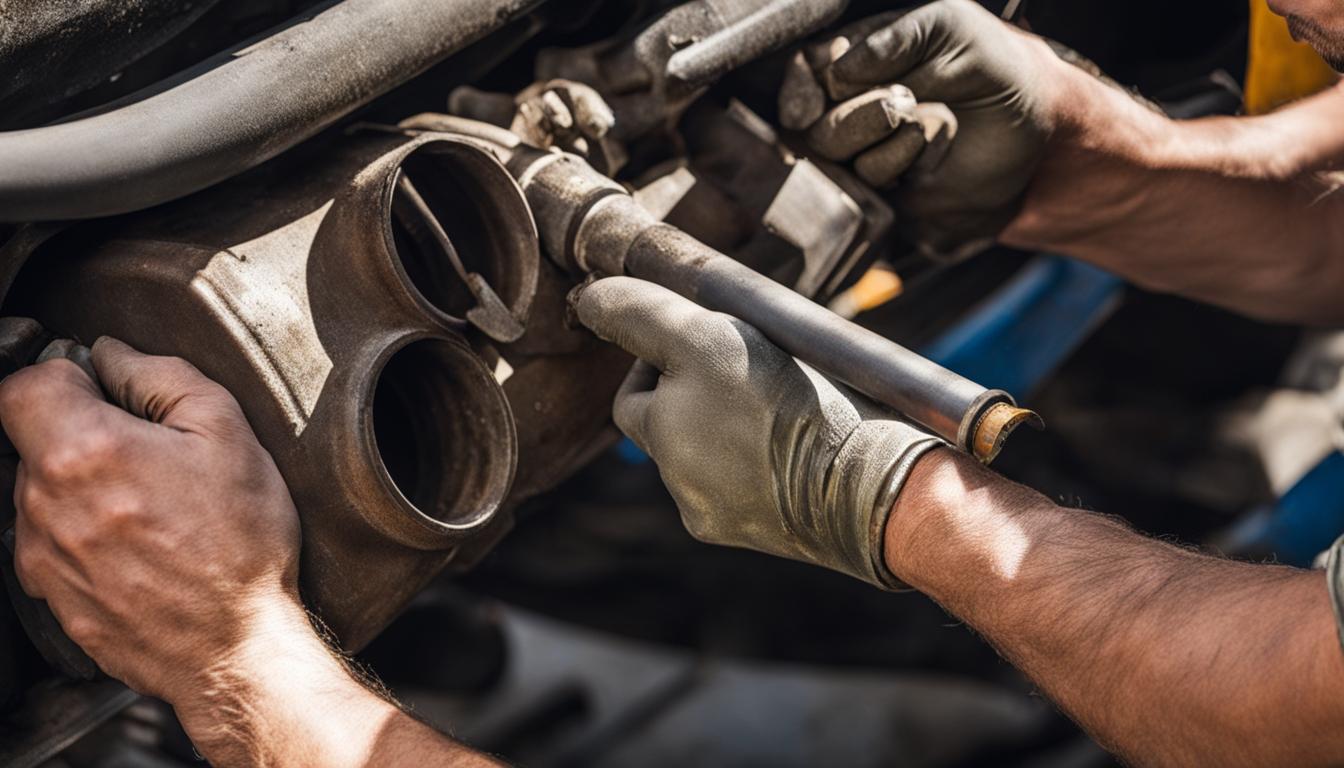A catalytic converter is a crucial component of a vehicle’s exhaust system that helps reduce harmful emissions. It converts toxic gases into less harmful compounds through a chemical reaction involving heat and precious metals like platinum and palladium. Catalytic converters are required by law in many countries and failing to have one installed can result in fines and penalties. If your catalytic converter needs replacement, it is important to choose the right type for your vehicle.
Key Takeaways:
- A catalytic converter helps reduce harmful emissions in a vehicle’s exhaust system.
- It is required by law in many countries and driving without one can result in fines.
- If your catalytic converter needs replacement, choose the right type for your vehicle.
- Catalytic converters use heat and precious metals to convert toxic gases into less harmful compounds.
- Regular maintenance and proper fuel usage can prolong the life of your catalytic converter.
Why Are Catalytic Converters Being Stolen?
Unfortunately, catalytic converter theft has become a growing concern in recent years. This criminal activity is driven by the valuable metals found inside the converter, such as platinum and rhodium. Thieves target catalytic converters because they can sell these metals for a high price in the scrap market.
While all vehicles with catalytic converters are potential targets, certain models are particularly susceptible. The Toyota Prius, for example, is a popular choice for thieves due to its larger quantity of precious metals in the converter. Additionally, trucks and SUVs are also common targets due to their higher ground clearance, making it easier for thieves to access the converters.
It is important to note that the economic impact of the COVID-19 pandemic may have contributed to the increase in catalytic converter theft. The economic downturn and rising unemployment rates have created a demand for quick cash, driving criminals to resort to theft.

Why Are Catalytic Converters Being Stolen?
| Reasons for Catalytic Converter Theft | Impact |
|---|---|
| Value of precious metals | Financial gains for thieves |
| Toyota Prius popularity | Higher precious metal content |
| Trucks and SUVs | Easy access due to ground clearance |
| Economic downturn | Increase in theft due to financial need |
“Catalytic converter theft has become a lucrative business for criminals, driven by the high value of precious metals found inside.”
To protect your vehicle from catalytic converter theft, consider taking preventive measures such as installing a protective device, parking in well-lit areas, and being vigilant about suspicious activities. Regularly checking for signs of tampering and seeking professional advice on appropriate security measures can also help deter thieves.
Protective Measures Against Catalytic Converter Theft:
- Install a catalytic converter protection device, such as a cage or shield
- Park in well-lit areas with surveillance cameras
- Engrave your vehicle identification number (VIN) on the converter
- Consider using tamper-resistant bolts
- Utilize motion sensor lights or alarms in your parking area
By being proactive and taking necessary precautions, you can reduce the risk of becoming a victim of catalytic converter theft and avoid the costly expense of replacement.
Signs of a Failing Catalytic Converter
A failing catalytic converter can lead to various issues with your vehicle’s performance and emissions. Knowing the signs of a bad catalytic converter can help you identify and address problems early on. Here are some common symptoms to watch out for:
- Strong sulfur-like smell: If you notice a strong sulfur smell coming from your vehicle’s exhaust, it may indicate a failing catalytic converter. This smell is caused by the converter’s inability to effectively convert hydrogen sulfide into less harmful compounds.
- Poor engine performance: A failing catalytic converter can negatively impact your engine’s performance. You may experience decreased power, sluggish acceleration, or difficulty starting the engine. This can be due to a clogged or cracked converter inhibiting the proper flow of exhaust gases.
- “Check engine” light on: The “check engine” light illuminating on your dashboard can be a sign of various issues, including a failing catalytic converter. The light may indicate a problem with the converter’s efficiency in transforming harmful gases, triggering the vehicle’s onboard diagnostic system to alert you of the issue.
If you notice any of these symptoms, it is important to have your catalytic converter inspected and potentially replaced by a professional mechanic. Ignoring a failing catalytic converter can lead to further damage to your vehicle’s engine and exhaust system, as well as increased emissions. Additionally, driving with a malfunctioning converter may result in a failed vehicle inspection, fines, or other legal consequences.
Regular maintenance and prompt attention to any signs of trouble can help prolong the life of your catalytic converter and ensure that your vehicle meets emissions standards. If you suspect a problem with your converter, consult with a qualified mechanic to assess the situation and determine the necessary course of action.

What Happens When You Drive Without a Catalytic Converter?
A catalytic converter is an essential component of a vehicle’s exhaust system, responsible for reducing harmful emissions and promoting cleaner air. However, some car owners may wonder what would happen if they were to drive without a catalytic converter. While it is technically possible for a car to function without one, it is not a sustainable or advisable long-term option.
When you drive without a catalytic converter, several issues can arise. One of the most noticeable effects is the increase in loud vehicle noises. Without the converter, the exhaust gases are not properly muffled, resulting in a louder and more disruptive engine sound.
Additionally, driving without a catalytic converter can lead to rough driving and acceleration. The converter plays a crucial role in regulating the flow of exhaust gases and maintaining engine performance. Without it, the engine may experience difficulties in running smoothly, leading to a rough driving experience.
Furthermore, driving without a catalytic converter can result in annual vehicle inspection failure. In many regions, vehicles are required to pass emissions tests during inspections. Without a properly functioning converter, the car will emit harmful gases beyond the acceptable limits, leading to a failed inspection.
In terms of environmental impact, driving without a catalytic converter causes increased emissions of harmful gases, contributing to air pollution. Catalytic converters are designed to convert toxic gases into less harmful compounds through a chemical reaction. Without the converter, the emissions released by the vehicle will contain higher levels of pollutants, posing risks to both human health and the environment.
In conclusion, while it may be possible to drive without a catalytic converter, it is not a recommended or sustainable solution. Doing so can lead to loud vehicle noises, rough driving and acceleration, annual vehicle inspection failure, increased emission of harmful gases, and potential fines. It is important to prioritize the maintenance and proper functioning of your catalytic converter to ensure both compliance with regulations and a cleaner environment.
How Can You Prevent Catalytic Converter Theft?
Protecting your catalytic converter from theft requires proactive measures and careful consideration. By taking the following steps, you can significantly reduce the risk of becoming a victim:
- Install a protective device: Consider investing in a catalytic converter cage or shield. These devices make it difficult for thieves to access and remove the converter.
- Use vibration-triggered alarms: Installing an alarm system that detects vibrations can deter theft attempts. When the vehicle is tampered with, the alarm will sound and alert nearby individuals.
- Park in well-lit and populated areas: Thieves are less likely to target vehicles in areas with high visibility. Choose parking spots that are well-lit and frequently visited by pedestrians or monitored by security cameras.
- Consult a professional mechanic: If you suspect any issues with your catalytic converter, have it inspected by a trusted mechanic. They can assess its condition, perform necessary repairs, or recommend a replacement if required. Maintaining the efficiency and functionality of your catalytic converter can deter theft attempts.
Remember, prevention is key when it comes to catalytic converter theft. By implementing these preventive measures, you can protect your vehicle and avoid the inconvenience, cost, and potential legal consequences associated with stolen catalytic converters.
| Preventive Measures | Effectiveness |
|---|---|
| Installing a protective device (cage or shield) | Highly effective |
| Using vibration-triggered alarms | Effective |
| Parking in well-lit and populated areas | Effective |
| Consulting a professional mechanic for repair or replacement | Highly effective |
Implementing these measures can minimize the risk of catalytic converter theft and provide peace of mind knowing that you have taken steps to protect your vehicle.
Tips for Maintaining Your Catalytic Converter
Maintaining your catalytic converter is essential for keeping it in good working condition and ensuring optimal performance. By following these tips, you can prolong the life of your catalytic converter and avoid costly repairs or replacements.
Regular Inspection and Cleaning
Regularly inspecting your catalytic converter is crucial to identify any signs of damage or blockage. Look for physical damage such as dents or cracks, as well as any buildup of debris or soot. Cleaning the converter can help remove any accumulated deposits and improve its efficiency. Use a soft brush or cloth to gently wipe away the debris, taking care not to apply excessive force that could damage the delicate converter.
Choose the Right Fuel
Using the appropriate fuel for your vehicle is important for the proper functioning of the catalytic converter. Follow the manufacturer’s recommendations regarding the octane rating and type of fuel to use. Using the wrong fuel can lead to increased emissions and potential damage to the converter over time.
Avoid Excessive Idling
Excessive idling can have a negative impact on the catalytic converter. When the engine idles for long periods, the converter may not reach its optimal operating temperature. This can lead to the buildup of unburned fuel and other deposits, reducing its efficiency. Whenever possible, avoid prolonged idling and shut off the engine if you anticipate being stationary for an extended period of time.
Summary
Proper maintenance is key to preserving the integrity of your catalytic converter. Regular inspection and cleaning, using the right fuel, and avoiding excessive idling can help extend the lifespan of your converter and ensure it continues to effectively reduce harmful emissions. By taking these simple steps, you can save money on repairs and replacements while contributing to cleaner air.

Conclusion
Catalytic converters are crucial for reducing harmful emissions and promoting cleaner air. They are not only required by law in many countries, but they also play a significant role in protecting the environment. Failing to have a catalytic converter installed can result in fines and penalties, making it essential to ensure compliance.
When it comes to catalytic converter replacement, it is important to consider the cost and price. Catalytic converter cost can vary depending on the type and model of your vehicle. Consulting a professional mechanic is recommended to ensure you choose the right type for your specific vehicle and to ensure its efficiency.
Maintaining your catalytic converter is equally crucial for its longevity and optimal performance. Regular inspection, cleaning, and checking for physical damage can help prevent potential issues. Additionally, using the right type of fuel and avoiding excessive idling can contribute to the overall health of your catalytic converter.
Protecting your catalytic converter from theft is another important aspect to consider. Installing protective devices, such as catalytic converter cages, can make it difficult for thieves to steal. Parking your vehicle in well-lit and highly populated areas can also deter theft attempts. Being proactive in taking preventive measures can save you from the hassle and cost of catalytic converter replacement.
FAQ
Do I need a catalytic converter?
Yes, a catalytic converter is a crucial component of a vehicle’s exhaust system that helps reduce harmful emissions. It is required by law in many countries and failing to have one installed can result in fines and penalties.
Why are catalytic converters being stolen?
Catalytic converters are being stolen due to the valuable metals, such as platinum and rhodium, found inside. Thieves steal them to sell these metals for scraps. The Toyota Prius is the most targeted car for catalytic converter theft, followed by trucks and SUVs.
What are the signs of a failing catalytic converter?
Signs of a failing catalytic converter include a sulfur-like smell, poor engine performance, and the “check engine” light being on.
What happens when you drive without a catalytic converter?
Driving without a catalytic converter can result in loud vehicle noises, rough driving and acceleration, annual vehicle inspection failure, harmful car emissions, and a potential fine for tampering with the emissions control system.
How can you prevent catalytic converter theft?
Preventive measures to deter catalytic converter theft include installing protective devices such as catalytic converter cages, using vibration-triggered alarms, and parking in well-lit and highly populated areas.
What are tips for maintaining your catalytic converter?
To maintain your catalytic converter, regularly inspect and clean it, check for physical damage, use the right type of fuel, and avoid excessive idling. Consulting a professional mechanic for repair or replacement can also help ensure its efficiency.
Can I recycle my old catalytic converter?
Yes, you can recycle your old catalytic converter. Be sure to check recycle catalytic converter price lists for recycling options.
